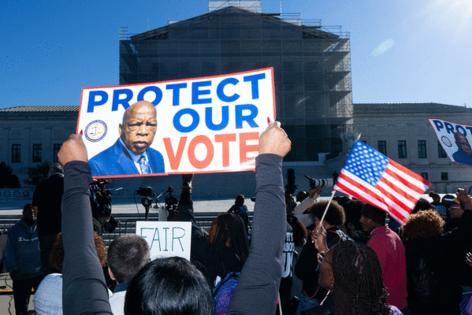Supreme Court airs doubts about role of race in redistricting
Published in Political News
WASHINGTON — The Supreme Court appeared ready Wednesday to rule against requiring Louisiana to have a second Black-majority district, as conservative and liberal justices clashed at oral arguments over what role race should play in congressional redistricting.
Justices spent more than two hours discussing the state’s congressional map that was redrawn to have two Black-majority districts instead of one after a lower court found that the original map likely violated the Voting Rights Act.
A focus was on whether the map violated the Constitution by using race to create a second Black-majority district, instead of relying only on traditional redistricting criteria such as politics.
A decision in the long-running legal dispute, expected before the conclusion of the term at the end of June, could have implications nationwide if it curtails a key section of the VRA, a civil rights-era law that has been used to ensure majority-minority congressional districts.
Key parts of the oral arguments focused on what the consequences would be of such a decision and whether the law needed to continue.
Justice Brett M. Kavanaugh said that Supreme Court cases have said that race-based remedies are allowed for a period of time — sometimes decades — but they should not be indefinite and should have an endpoint.
“And what exactly do you think the endpoint should be, or how would we know for the intentional use of race to create districts?” Kavanaugh asked.
Justice Samuel A. Alito Jr. appeared to take issue with the argument that the first congressional map was discriminatory. He argued those lines, to a large extent, followed a map that was in place for the prior decade.
The state first adopted a congressional map after the 2020 census that included one Black-majority congressional district.
“What was the origin of that prior map? Do I remember correctly that it was pre-cleared by the Justice Department?” Alito asked.
“Twice,” responded Louisiana Solicitor General J. Benjamin Aguiñaga.
Justice Neil M. Gorsuch asked if it’s OK for a court to intentionally discriminate on the basis of race in a remedial map.
Janai Nelson, president and director-counsel of the NAACP Legal Defense Fund, rebuffed the concept of discriminating on the basis of race, but said there might be circumstances in which the only possible solution is the limited use of race.
“I think those circumstances are rare and the permissibility of race is constrained by strict scrutiny,” Nelson said.
Justice Ketanji Brown Jackson said Section 2 of the Voting Rights Act is not a remedy itself, but instead a mechanism that determines whether a remedy is needed.
“So it’s a law that is just encouraging or requiring a check-in,” Jackson said. “It’s like a tool. It’s like a tape measure that we’re looking at as to whether or not certain circumstances exist.”
Those circumstances are “unequal access to electoral opportunity,” Jackson said.
In the first map Louisiana drew in response to the 2020 census, Black voters made up about one-third of the state’s voting population but were a majority in only one of the state’s six congressional districts.
The state redrew its map to include a second Black majority district after a court found the first map likely violated the Voting Rights Act.
The oral arguments come at a time ahead of the midterm elections when Texas has redrawn their map and officials in other states are publicly considering doing so as well.
Voting rights proponents say a ruling that guts the VRA could open a path for Republicans to cement long-term control in the closely divided House.
During arguments, Nelson said the results would be “pretty catastrophic” if Section 2 was not able to operate as it has in the past, adding that every congressional member from Louisiana who is Black is from a Voting Rights Act opportunity district.
“We only have the diversity that we see across the South, for example, because of litigation that forced the creation of opportunity districts under the Voting Rights Act,” Nelson said.
Later in the arguments, Kavanaugh turned attention back on Nelson’s point and asked the Louisiana solicitor general if he wanted to respond.
“I think there’s been a lot of ‘sky is falling’ rhetoric from the other side in this case,” Aguiñaga said.
In the case of Louisiana, if the Republican Legislature wanted to maximize its political seats by drawing a 6-0 map in favor of Republicans, lawmakers would be turning safe GOP seats for high-profile incumbents into more purple districts, Aguiñaga said.
“I don’t know what our legislature would do if the court rules in our favor, but I’m just saying that’s one political reality that makes me pause and say, ‘I don’t think the sky is going to fall,’” Aguiñaga said.
_____
©2025 CQ-Roll Call, Inc., All Rights Reserved. Visit cqrollcall.com. Distributed by Tribune Content Agency, LLC.
























































Comments